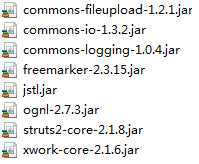标签:
第01步:配置web.xml
<?xml version="1.0" encoding="UTF-8"?> <web-app version="2.4" xmlns="http://java.sun.com/xml/ns/j2ee" xmlns:xsi="http://www.w3.org/2001/XMLSchema-instance" xsi:schemaLocation="http://java.sun.com/xml/ns/j2ee http://java.sun.com/xml/ns/j2ee/web-app_2_4.xsd"> <filter> <filter-name>struts2</filter-name> <filter-class>org.apache.struts2.dispatcher.ng.filter.StrutsPrepareAndExecuteFilter</filter-class> </filter> <filter-mapping> <filter-name>struts2</filter-name> <url-pattern>/*</url-pattern> </filter-mapping> <welcome-file-list> <welcome-file>index.jsp</welcome-file> </welcome-file-list> </web-app>
第02步:编写action类
package com.self.action; import java.io.File; import org.apache.commons.io.FileUtils; import org.apache.struts2.ServletActionContext; import com.opensymphony.xwork2.ActionContext; /**文件上传**/ public class FileUpload { private File[] image;//得到上传的文件 private String[] imageFileName;//获取上传文件的名称,命名规则:页面属性名+FileName private String[] imageContentType;//得到上传文件的类型 public FileUpload() { } /**上传方法**/ public String uploadFile(){ try { String realPath=ServletActionContext.getServletContext().getRealPath("/images"); System.out.println("工程路径(/images路径,文件保存路径):"+realPath); if(image!=null){ System.out.println("已经获得上传文件!"); File parentFile=new File(realPath);//指定文件保存路径 if(!parentFile.exists()){//保存路径不存在,则创建 parentFile.mkdirs(); } for(int i=0;i<image.length;i++){ File saveFile=new File(parentFile,imageFileName[i]);//parentFile:保存路径,imageFileName:保存文件名 FileUtils.copyFile(image[i], saveFile);//将上传的image复制到saveFile中 } ActionContext.getContext().put("message", "保存成功!"); } } catch (Exception e) { e.printStackTrace(); } return "tsuccess"; } public File[] getImage() { return image; } public void setImage(File[] image) { this.image = image; } public String[] getImageFileName() { return imageFileName; } public void setImageFileName(String[] imageFileName) { this.imageFileName = imageFileName; } public String[] getImageContentType() { return imageContentType; } public void setImageContentType(String[] imageContentType) { this.imageContentType = imageContentType; } }
第03步:配置struts.xml
<?xml version="1.0" encoding="UTF-8" ?> <!DOCTYPE struts PUBLIC "-//Apache Software Foundation//DTD Struts Configuration 2.0//EN" "http://struts.apache.org/dtds/struts-2.0.dtd"> <struts> <constant name="struts.action.extension" value="do,action"/> <package name="transform" namespace="/" extends="struts-default"> <action name="list_*" class="com.self.action.FileUpload" method="{1}"> <result name="tsuccess"> /outdata.jsp </result> </action> </package> </struts>
第04步:编写界面
<%@ page language="java" import="java.util.*" pageEncoding="utf-8"%> <html> <body> <form method="post" action="list_uploadFile.action" enctype="multipart/form-data"> 文件1:<input type="file" name="image"> 文件2:<input type="file" name="image"> 文件3:<input type="file" name="image"> <BR> <input type="submit" value="上传文件"> </form> </body> </html>
第05步:注意事项
注意事项请参考:struts文件上传(单文件)
第06步:导入包

标签:
原文地址:http://www.cnblogs.com/zjsy/p/4304493.html